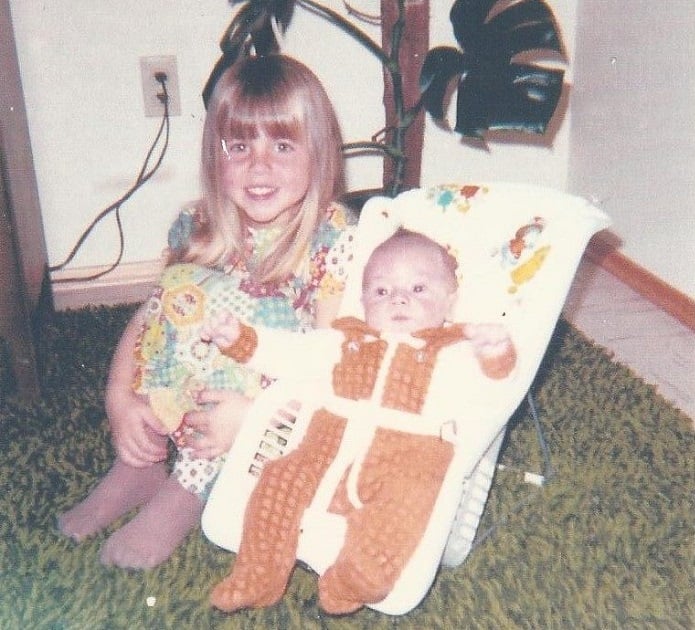September 15th was my brother Brett’s 50th birthday.
It should’ve been a huge celebration with family, friends, presents, love, and laughter. But there won’t be a big party.
All these years later, I can still hear this message ringing in my ears:
“Your brother was a junkie who deserved to die.”
Anyone who loves or has lost someone addicted to drugs or alcohol has heard this very statement in some form or another. Many times. It can often be ignored, tolerated, accepted.
And maybe someone hasn’t said it to us directly, in those exact words, but we hear them loud and clear. And so does our loved one.
I don’t typically react—it’s not my style and it is a waste of valuable energy for me to scream and challenge every person with whom I come into contact.
But everyone can be pushed past their limits. Pushed to where they have had enough. They’re hurt. They’re frustrated. And they need to stand up for what they believe is right when someone else can’t find the courage to have a voice of their own.
It’s not because I’m fighting my brother’s battles; after all we are no longer two and six years old playing in the neighborhood sand box. But rather because I have walked this painful road, witnessed the judgment, and because of that I see the world in a more empathetic way.
I remember vividly my mother and I sitting for about an hour, waiting for my brother to be seen in the emergency room. His leg rattled with anxiety until he was taken into a private room. We explained to the nurse that Brett was severely intoxicated and needed help to safely withdraw off the alcohol; not that we needed to as his situation was very clear from his scruffy appearance and glassy eyes. And she began to take his vitals.
It wasn’t the nurse’s cold, disassociated approach while taking my brother’s blood pressure, pricking his arm with a needle, or asking him how much he had had to drink that made my blood boil. It was the fact that it was obvious she absolutely loathed him. For the first time ever, like a bolt of electricity running through my veins, I felt judgment—exactly what my brother must have felt. Pure unadulterated judgment. As she left the room, I scampered quickly behind her, catching up in front of the nurse’s station.
“Excuse me,” I said. She didn’t hear me so I repeated myself. She turned around to look at me.
“Hi. Listen, I don’t mean to be rude. I completely understand and appreciate how hard your job is and how many different things you must see. I even get that on some level maybe to you my brother isn’t sick in the same way as most of the people here, and that you believe this may be purely self-induced. What I need to remind you is that he is a human being.”
She didn’t blink.
I continued, “Now I don’t care what you did yesterday or how you are tomorrow. All I care about is that for right now, when you come into that room, you show a little compassion as that is a person in there. A person! That is someone’s brother, someone’s son. And despite what you very obviously perceive as completely disgusting, someone loves him. Do you think you can do that?”
I didn’t give her time to answer.
“Cause if you can’t, then what I suggest is that for the next hour or so you fake it!”
I walked away, so I didn’t have to look at her stony expression for another second. Before stepping through the door to sit quietly in the corner of my brother’s room, I caught my breath as I was so overwhelmingly pissed off.
I understand and appreciate how hard nurses work—after all, my mother is a nurse—and I can imagine that they see all sorts of things. But that’s their job—a job that they choose. To treat someone so obviously, whatever their circumstance, like they are below dirt, I cannot take. As I looked at my brother at his worst, just as I had done so many times before, all I thought was he is in there.
The doctor arrived a short time later. I knew the drill; it seemed like I had heard this a thousand times before. They couldn’t keep Brett overnight as all the beds were full, although I appreciate the doctor did give him a shot of Valium. At least I think it was Valium, which by then I knew belongs to the class of medications called benzodiazepines. It is used for the short-term relief of symptoms of mild to moderate anxiety and for alcohol withdrawal. Mom and I knew that at least it would help Brett get through the night, and the suggestion the doctor offered was for us to head back to the detox center in the morning.
What most people don’t know is that people with severe addiction can actually die from the effects of withdrawal. Whether you want to challenge your mind with that truth or not, the choice debate doesn’t work here: they cannot just stop.
My brother needed medical supervision and help as he came off the booze. Normally it would take four to six days in which he would be given things like Valium to ease his way through the excruciating pain and suffering of the withdrawal process. Alcohol is actually one of the most dangerous substances to come off. People addicted to alcohol can experience symptoms like nightmares, vomiting, diarrhea, shivering, sweating, racing heart, fever, shaking, tightness in the chest, and difficulty breathing.
That is if things go well.
If things go badly, our loved ones can have a stroke, a heart attack, or a grand mal seizure. During withdrawal, long-term alcohol users can suffer psychosis that manifests as hallucinations and delusions, which is why they need to be monitored by a health care professional. Delirium tremors (DT’s) can sometimes be associated with severe, uncontrollable tremors of the extremities and secondary symptoms such as anxiety, panic attacks, and paranoia. All these realities. And yet we are once again being sent on our way as all the beds were full.
It seemed like a completely different nurse came into the room, yet it wasn’t. She was kind, compassionate, and caring, and as we left, she said to my brother, “Take care of yourself, Brett.”
I whispered, “Thank you” to her as we walked out the door, and I hope she knew how much I meant it.
My magnificent, smart, witty, handsome, kind, soft-spoken, and much-loved brother took that first sip of alcohol in high school, as most of our own young children will do some day. Sadly, he lost his battle with severe substance use, anxiety, and depression on March 18, 2012, when he took his own life.
I remember vividly a few months after he passed away, someone in our family circle was standing in my office and said directly to me:
“Your brother was a junkie who deserved to die. He had more than enough chances.”
I could’ve been rattled, offended, shocked. I could have screamed, yelled, and told him to get the hell out of my office. But I didn’t. Instead, I calmly took a sip of my coffee, said a little “hmmm” to myself and changed the topic. I assure you it was not because I am quiet, scared, or I didn’t know what I wanted to say. But rather the opposite as I am confident, bold, outspoken, and honest (too honest for some, quite frankly, and I don’t care).
I have no interest in getting into a war of words. I have grown and learned so much since that hospital room visit so many years ago. I have learned that stigma is alive and well, not only in the healthcare profession. In society. In the media. And even in our own families and circle of friends.
I am not shocked nor surprised that we live in a world where some believe this statement about my brother and others battling addiction or mental illness. What continues to surprise me is that we live in a world where it is acceptable to say it out loud. That somehow, it is all right to inflict intentional pain on someone who has lost someone they love very much.
My approach is choosing to dedicate my time and energy into calmly and confidently sharing my journey and experience—every uncomfortable piece of it—without shame.
The truth is I have been surrounded by alcoholism my whole life; it is on many branches of my family tree. But what I experienced with my brother, most could not fathom. I feel that if people hear the whole story, beginning with us as innocent children, it might open their hearts, change their perceptions, and perhaps give understanding and insight for people with addiction and/or mental health challenges in society—our mothers, fathers, wives, husbands, daughters, sons, brothers, sisters, aunts, uncles, grandparents, friends, and neighbors.
I am not going to spend my life arguing, debating, or letting people break my spirit for what I know and believe with all my heart. What I remind myself when I share our story is that this way of thinking and speaking about Brett with hurtful, condemning comments is not at all about my brother’s character or who he was—it is about theirs.
~
Please consider Boosting our authors’ articles in their first week to help them win Elephant’s Ecosystem so they can get paid and write more.
~


 Share on bsky
Share on bsky





Read 15 comments and reply